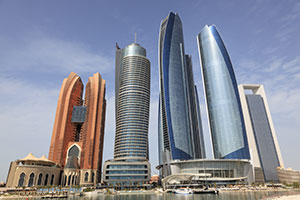Globus
Enjoy a 3-night stay in Dubai to experience the city’s Old-World markets and world-class shopping, sweeping sand dunes and dazzling beaches, and traditional Bedouin villages and futuristic vibe. Among the world’s tallest buildings await the world’s loftiest experiences.
How do you express your eternal devotion to the love of your life? Mughal Emperor Shah Jahan enlisted the help of more than 20,000 workers and 1,000 elephants to erect a towering white marble mausoleum dedicated to his wife who died during childbirth. A sunrise visit to the magnificent Taj Mahal, one of the New7Wonders of the World, is just the beginning of your love affair with India. Beyond India’s most sparkling jewel lies a priceless gem mine of experiences you’ll treasure for a lifetime. Hop in a rickshaw for a ride through Delhi’s centuries-old Chandni Chowk bazaar, sit down for traditional Indian cuisine in the home of a noble family in Jaipur, and embark on three thrilling open-air safari game drives through Ranthambore National Park in search of marsh crocodiles, striped hyenas, and the elusive Bengal tiger.
Next, you’ll travel to fascinating Kathmandu, Nepal. Enjoy guided sightseeing in Nepal’s iconic capital city, including a visit to the historic seat of royalty at Hanuman Dhoka. Visit the residence of the Living Goddess at Temple of Kumari, and travel to Bouddhanath-one of the world’s largest stupas and the center of Tibetan Buddhism in Nepal. Marvel at the Hindu and Buddhist sites in Patan’s Durbar Square. A mosaic of memories awaits on this radiant tour of Dubai, India, and Nepal.
Featured Destinations
Ranthambore National Park
Ranthambore National Park
The Ranthambhore National Park stretches across an area of 1,334 sq km on the eastern edge of the Thar Desert. Once the hunting grounds of the erstwhile ruling family of Jaipur, today it is one of the last sanctuaries of the big cat, the Royal Bengal Tiger. Ranthambore actually consist of not one, but three, wildlife preserves: the Ranthambore National Park itself, the Sawai Mansingh Sanctuary and the Keladevi Sanctuary.
Ranthambore is an oasis of dense dry deciduous forests amidst a vast tract of semi arid scrub and thorny desert vegetation surrounded by the hills of the Vindhyas and the Aravalis.
An ancient fort lies within the park boundaries of Ranthambore, adding to its charm. Ravines, nallahs, water bodies and waterfalls add to its beauty and offer many natural hideouts for tigers and the other wildlife endemic to this park.
Part of Project Tiger (one of Asia's most important conservation efforts), Ranthambore is the favorite haunt of wildlife buffs and professional wildlife photographers from around the world who come to see tigers, panthers, wild cats, hyena, jackal, marsh crocodile, wild boar, bears, many species of deer and a rich birdlife of over 300 species, including the great Indian horned owl. Ranthambore encompasses three lakes: Raj Bagh, Malik Talab and Padam Talab, where aquatic birds can be seen.
|
|
Agra
Agra
In the mid 16th century and early 17th century, Agra witnessed a frenzied building activity and it was during this time when the symbol of love Taj Mahal was built. The buildings made during this era were purely in the contemporary Mughal style and of very high quality which is still reflected in what ever monuments remain in Agra. The narrow lanes of Agra filled with aroma of Mughlai cuisine, the craftsman who are busy creating masterpieces with their skill all remind of the Mughal royalty which this city had once experienced. Today whatever remains, has become a major tourist attraction which has taken Agra again to the heights of glory but this time as a major tourist destination of India. Main shopping areas include Taj Mahal complex, Kinari Bazaar, Raja Mandi, Sadar Bazaar. the Gangotri at Taj Mahal Complex and the Up Handlooms, UPICA at the Sanjay place are two UP Government emporiums.
|
Destination Guide
|
Dubai
Dubai
Dubai is a member of the United Arab Emirates, the cluster of sheikdoms along the Arabian Sea. Located at the crossroads between East and West, the emirate's long-standing trading tradition has for centuries brought visitors from throughout the Middle East and neighbouring regions. Now modernized, Dubai continues to attract many with its international facilities and its exotic, yet cosmopolitan lifestyle. Dubai has the best prices in the Arab Gulf states for gold, electronics, perfumes and is a tax-free city. It also has good beaches and excellent resort hotels. The town was the residence of the British political agent for the former Trucial States from 1954 until 1971. Known as the Venice of the Gulf, Dubai is the chief port and commercial center of the United Arab Emirates.
|
Destination Guide
|
Kathmandu
Kathmandu
Kathmandu is the capital of Nepal and is located at an elevation of 4,600 feet in Kathmandu Valley. Buddhist and Hindu pilgrims from all over the world visit the religious sites of Kathmandu, making tourism is a primary industry. Kathmandu is a city rich is culture and history dating back nearly 2000 years, and Kathmandu Valley has been listed as a UNESCO World Heritage Site due to its 7 groups of monuments and buildings with outstanding universal value.
|
Destination Guide
|
Jaipur
Jaipur
Jaipur, popularly known as the Pink City, was founded in 1727 AD by one of the greatest rulers of the Kachhawaha clan, the astronomer king Sawai Jai Singh. The pink color was used at the time of making to create an impression of red sandstone buildings of Mughal cities - and repainted in 1876, during the visit of the Prince of Wales. The city is best explored on foot and the adventurous visitor willing to go into the inner lanes can discover a whole new world not visible to the tourist-in-a-hurry.
|
Destination Guide
|
Delhi (New Delhi)
Delhi (New Delhi)
Delhi is the third largest city and consists of Old Delhi and New Delhi. Old Delhi was the capital of India Between 17th and 19th centuries and now contains many mosques, monuments and forts relating to India's muslim history. The other Delhi is the imperial city created as the capital of India by the British. In addition to its historic interest and role as government center, Delhi is a major travel gateway. The architectural designs and sophistication that buildings in Delhi like Parliament House, Rashtrapati Bhavan, India Gate, Connaught Place and various administrative buildings like the South and North blocks along the breathtaking view available from Raj Path, show British influence. Modern Delhi has a cosmopolitan culture that nurtures festivals of all faiths and religions. Theatre, drama and entertainment of all sorts including discotheques are there.
|
Destination Guide
|
View Full Itinerary
Valid Date Ranges






